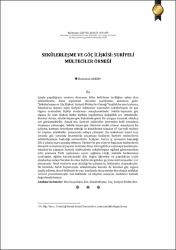| dc.description.abstract | Secularization, which has the characteristic of determining the language of the modern world we live in, means the weakening of the social influence of religion. This qualitative study, entitled Secularization, and Immigration Relationship: The Case of Syrian Refugees, aims to examine the relationship between secularization and migration through Syrian refugees residing in Istanbul. The relationship of secularization with the phenomenon of migration varies in different social structures. Therefore, it seems quite difficult to reach a general judgment in the relationship between secularization and immigration. However, we will try to reach certain conclusions about Syrian refugees. This study, which aims to analyze the relationship between secularization and migration, has emerged as a result of interviews with 15 Syrian refugees who were reached by snowball sampling technique. The main thesis of this article is that the Syrian refugees who started to live in Istanbul after the forced migration started to become secular. Frankly, Syria since March 2011 as the starting year of the civil war Syrian refugees have begun to migrate to Turkey. Since then, the influence of religion on the individual and social lifestyle of refugees has been declining. Behind the secularization tendency of the Syrian refugees living in Istanbul, there is the desire to adapt to Turkish society, to move away from peer pressure, to learn religion correctly in educational institutions, and to revise their relations with God because of the tragic events they have experienced. This study, which is based on qualitative data, consists of three parts. In the first part, the phenomenon of immigration with secularization theory with different dimensions is analyzed, and in the second part, the interview data are interpreted. In the last section, the results are evaluated in terms of items. | en_US |



















